Morocco
| | This section is empty. You can help by adding to it. (November 2021) |
This is a list of articles on public policy topics, arranged by country.
| | This section is empty. You can help by adding to it. (November 2021) |

Canada's long and complex relationship with the United States has had a significant impact on its history, economy, and culture. The two countries consider themselves among the "closest [of] allies". They share the longest border between any two nations in the world, and also have significant military interoperability. Both Americans and Canadians have generally ranked each other as one of their respective "favorite nations". Canadian peacekeeping is deeply embedded in Canadian culture and a distinguishing feature that Canadians feel sets their foreign policy apart from the United States. Canadian Anti-Americanism manifests itself in a variety of ways, ranging from political, to cultural.
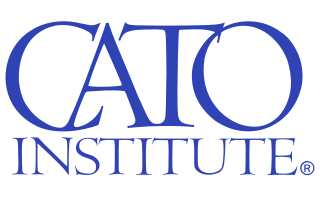
The Cato Institute is an American libertarian think tank headquartered in Washington, D.C. It was founded in 1977 by Ed Crane, Murray Rothbard, and Charles Koch, chairman of the board and chief executive officer of Koch Industries. Cato was established to focus on public advocacy, media exposure and societal influence.
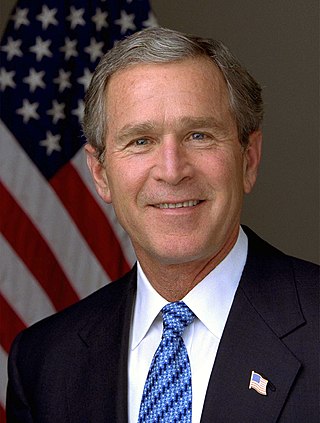
George W. Bush's tenure as the 43rd president of the United States began with his first inauguration on January 20, 2001, and ended on January 20, 2009. Bush, a Republican from Texas, took office following his narrow Electoral College victory over Democratic incumbent vice president Al Gore in the 2000 presidential election, in which he lost the popular vote to Gore by 543,895 votes. Four years later, in the 2004 presidential election, he narrowly defeated Democrat nominee John Kerry, to win re-election. Bush served two terms and was succeeded by Democrat Barack Obama, who won the 2008 presidential election. Bush is the eldest son of the 41st president, George H. W. Bush.
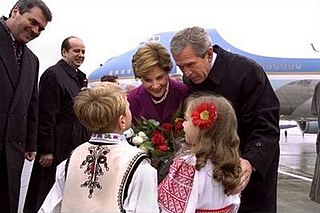
The main event by far shaping the foreign policy of the United States during the presidency of George W. Bush (2001–2009) was the 9/11 terrorist attacks against the United States on September 11, 2001, and the subsequent war on terror. There was massive domestic and international support for destroying the attackers. With UN approval, US and NATO forces quickly invaded the attackers' base in Afghanistan and drove them out and the Taliban government that harbored them. It was the start of a 20-year quagmire that finally ended in failure with the withdrawal of United States troops from Afghanistan.
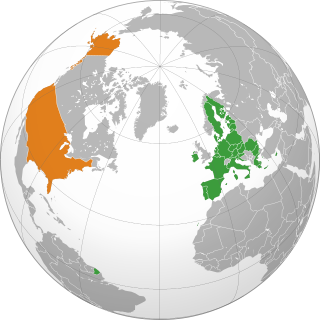
Relations between the European Union and the United States began in 1953, when US diplomats visited the European Coal and Steel Community in addition to the national governments of its six founding countries. The two parties share a good relationship which is strengthened by NATO, cooperation on trade, and shared values.
A guest worker program allows foreign workers to temporarily reside and work in a host country until a next round of workers is readily available to switch. Guest workers typically perform low or semi-skilled agricultural, industrial, or domestic labor in countries with workforce shortages, and they return home once their contract has expired.

Relations between India and the United States date back to India's independence movement and have continued well after independence from the United Kingdom in 1947. Currently, India and the United States enjoy close relations and have deepened collaboration on issues such as counterterrorism and countering Chinese influence in the Indo-Pacific.
Barack Obama, President of the United States from 2009 to 2017, served as a U.S. senator from Illinois from 2005 to 2008 and as an Illinois state senator from 1997 to 2004. A member of the Democratic Party, he made his presidential run in 2008. He was elected President in 2008 and re-elected in 2012.

United States energy independence is the concept of eliminating or substantially reducing import of petroleum to satisfy the nation's need for energy. Some proposals for achieving energy independence would permit imports from the neighboring nations of Canada and Mexico, in which case it would be called North American energy independence. Energy independence is espoused by those who want to leave the US unaffected by global energy supply disruptions and would restrict reliance upon politically unstable states for its energy security.

The United States was, in 1824, the second country to recognize the independence of Brazil, after Argentina did it in 1823. Brazil was the only South American nation to send troops to fight in Europe alongside the Allies in World War II.

Joe Biden, President of the United States, served as Vice President from 2009 to 2017 and in the United States Senate from 1973 until 2009. A member of the Democratic Party, he made his second presidential run in 2008, later being announced as Democratic presidential nominee Barack Obama's running mate in 2008. He was elected vice president in 2008 and re-elected in 2012. In April 2019, Biden announced his 2020 presidential campaign. He became the presumptive Democratic nominee in April 2020, was formally nominated by the Democratic Party in August 2020, and defeated Republican incumbent Donald Trump in the November 2020 election.
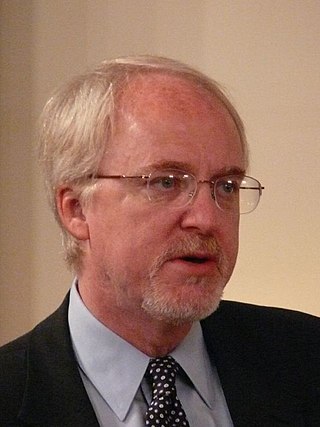
John Ross Beyrle is an American diplomat. A career Foreign Service Officer and specialist in Russian and Eastern European affairs, he served as Ambassador of the United States to the Russian Federation from July 3, 2008, until January 10, 2012, and as Ambassador to Bulgaria from 2005 to 2008.
The policies of the United States of America comprise all actions taken by its federal government. The executive branch is the primary entity through which policies are enacted, however the policies are derived from a collection of laws, executive decisions, and legal precedents.

Barack Obama's tenure as the 44th president of the United States began with his first inauguration on January 20, 2009, and ended on January 20, 2017. Obama, a Democrat from Illinois, took office following his victory over Republican nominee John McCain in the 2008 presidential election. Four years later, in the 2012 presidential election, he defeated Republican nominee Mitt Romney, to win re-election. Obama is the first African American president, the first multiracial president, the first non-white president, and the first president born in Hawaii. Obama was limited to two terms and was succeeded by Republican Donald Trump, who won the 2016 presidential election.

The term Obama Doctrine is frequently used to describe the principles of US foreign policy under the Obama administration (2009–2017). He relied chiefly on his two highly experienced Secretaries of State—Hillary Clinton (2009–2013) and John Kerry (2013–2017)—and Vice President Joe Biden. Main themes include a reliance on negotiation and collaboration rather than confrontation or unilateralism.
U.S. President Barack Obama's East Asia Strategy (2009–2017), also known as the Pivot to Asia, represented a significant shift in the foreign policy of the United States since the 2010s. It shifted the country's focus away from the Middle Eastern and European sphere and allowed it to invest heavily and build relationships in East Asian and Southeast Asian countries, especially countries which are in close proximity to the People's Republic of China (PRC) either economically, geographically or politically to counter its rise as a rival superpower.
For purposes of U.S. foreign policy, Europe consists of the European Union and non-EU states in Europe.

The Obama–Medvedev Commission, officially known as the U.S.–Russia Bilateral Presidential Commission, was announced on July 6, 2009 by President of the United States Barack Obama and President of the Russian Federation Dmitry Medvedev during President Obama's visit to Moscow, as a way to improve communication and cooperation between the governments of Russia and the United States. The two Presidents announced that the work of the Commission would be coordinated by Secretary of State Hillary Clinton and Russian Foreign Minister Sergei Lavrov.

The Reagan era or the Age of Reagan is a periodization of recent American history used by historians and political observers to emphasize that the conservative "Reagan Revolution" led by President Ronald Reagan in domestic and foreign policy had a lasting impact. It overlaps with what political scientists call the Sixth Party System. Definitions of the Reagan era universally include the 1980s, while more extensive definitions may also include the late 1970s, the 1990s, and even the 2000s. In his 2008 book, The Age of Reagan: A History, 1974–2008, historian and journalist Sean Wilentz argues that Reagan dominated this stretch of American history in the same way that Franklin D. Roosevelt and his New Deal legacy dominated the four decades that preceded it.

The Foreign Affairs Policy Board is an advisory board that provides independent advice and opinion to the Secretary of State, the Deputy Secretary of State, and the Director of Policy Planning on matters concerning U.S. foreign policy. The Board reviews and assesses global threats and opportunities, trends that implicate core national security interests, tools and capacities of the civilian foreign affairs agencies, and priorities and strategic frameworks for U.S. foreign policy. The Board meets in a plenary session several times a year at the U.S. Department of State in the Harry S. Truman Building.